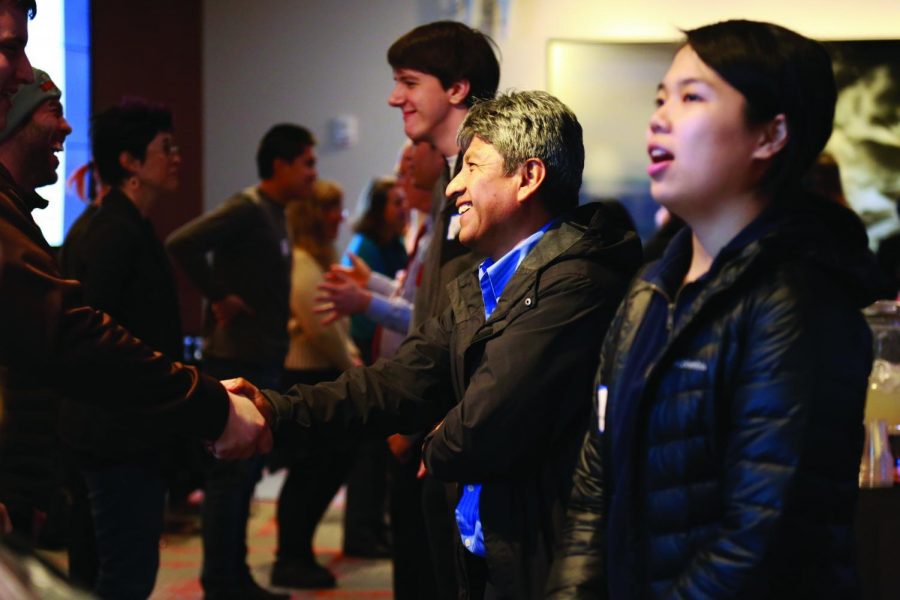FIRST! Program creates opportunities for first-generation college students
February 13, 2017
Ninety-three Oregon State University undergraduate students, graduate students and faculty gathered in the Memorial Union Horizon Room on Thursday, Feb. 2. They represented many different majors, ages, interests and ethnicities. A few were nervous, others confident, but they all had one thing in common: all of them were interested in applying to the FIRST! Program, a mentorship program designed to improve either their personal college experiences, or to help improve the experiences of other students.
The FIRST! Program will consist of first-generation students and their mentors, graduate students and staff. First-generation students are the first in their family to attend post-secondary education. The mentors will focus on providing students with key information about OSU and general college life. They will be available to help their mentees monthly with all concerns and questions surrounding academics and work, as well as personal problems.
Although applications for the FIRST! Program closed on Feb. 10, the program will continue connecting students to other first-generation students and alumni through events. Information on the next round of FIRST! Program applications will be available at the next event, which will take place in mid-April.
The mentors do not need to be first-generation students themselves, but during the application process students can opt for a mentor who is also first generation.
The mentorship program is designed to help first-generation students navigate college, but will also exist to inform the university about their experiences and needs. The Division of Undergraduate Studies will use this information in considering the support systems in place for these students, according to academic
counselor Jenesis Long.
“We’re using qualitative answers as to what it is like to be first generation,” Long said.
As a first-generation college student, Long believes this program will be helpful based on her own experiences.
“Coming from a rural community, it was good for me to find mentors. I needed to find a community,” Long said. “Finding people who had a similar identity was helpful.”
First-generation student Rachel Sousa applied to the mentorship program. According to Sousa, having a mentor who is open to sharing about their own experiences and guiding her through college would be helpful.
“It’s difficult because my parents don’t know a whole lot about things like internships and research. They don’t know what happens,” Sousa said. “I don’t have someone to fall back on.”
Sousa’s parents both completed one year of community college before her father joined the Navy. They had to move to Chicago, and by then higher education was no longer a priority, according to Sousa.
Along with Sousa, Lizeth Carranza is a first-generation student, but just transferred to OSU. She is applying to the mentorship program to make connections and receive guidance,
according to Carranza.
“It’s barely my second term,” Carranza said. “It’s taking some exploring.”
Carranza believes having a mentor will help guide her through her adjustment to OSU.
“I want more than just someone telling me what I need to do,” Carranza said.
As a first-generation student, Carranza is under a lot of pressure from her parents. She said they don’t know how demanding college is, and expect her to receive good grades easily.
“My parents have high standards for me. They can’t help me,” Carranza said.
According to Carranza, her parents didn’t have the money or opportunity to pursue higher education themselves.
The faculty mentors are also enthused over the project.
Debbie Farris is the assistant director of marketing and communications for the College of Science at OSU. She’s applying to be a mentor because she is passionate about students and finds it inspiring, according to Farris.
“There’s lots of learning on both sides,” Farris said.
Farris is looking forward to sharing about her experience as a first-generation student. When she was in school, no one discussed being first generation, and students had to figure out their plans on their own, according to Farris.
“There were missed opportunities,” Farris said. “If I had just been more aware, I would have taken different jobs, done more internships, done more volunteering.”
As a mentor, Farris would be able to guide students going through the same stage she had been in, as well as learn about
their specific situations.
“I learn so much about the experience just from talking to students for a few minutes,” Farris said.
Not all people involved in the FIRST! Program are first-generation students, however. Beth Filar-Williams, head of the library experience and access department, grew up watching her parents attend college as first-generation students, and was able to attend college herself.
“It was hard to see them work full time and go to school and have kids,” Filar-Williams said.
Because of her unique perspective and position at the library, Filar-Williams believes she would excel as a mentor for a
first-generation student.
“I’ve been a mentor throughout my career. So I would hope to be able to encourage people, to be the support network that they need. Give them a little boost to help them out during their time here. I would love to be able to support them,” Filar-Williams said. “If it wasn’t for them, I wouldn’t be here.”
Students interested in the FIRST! Program are invited to attend another mixer in April, location and date to be announced through email.










































































































